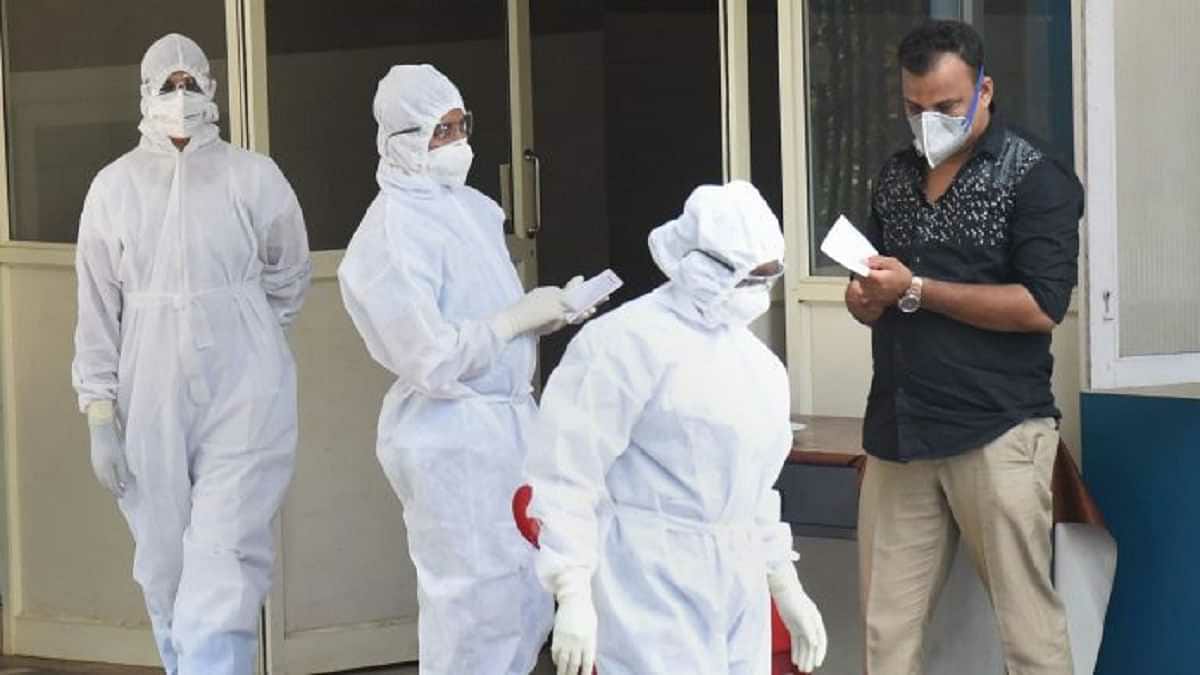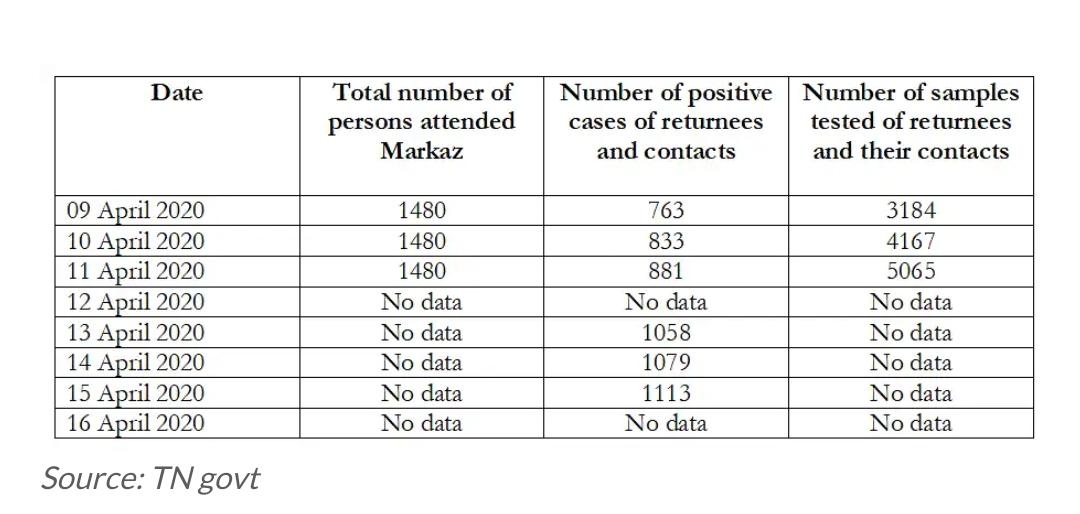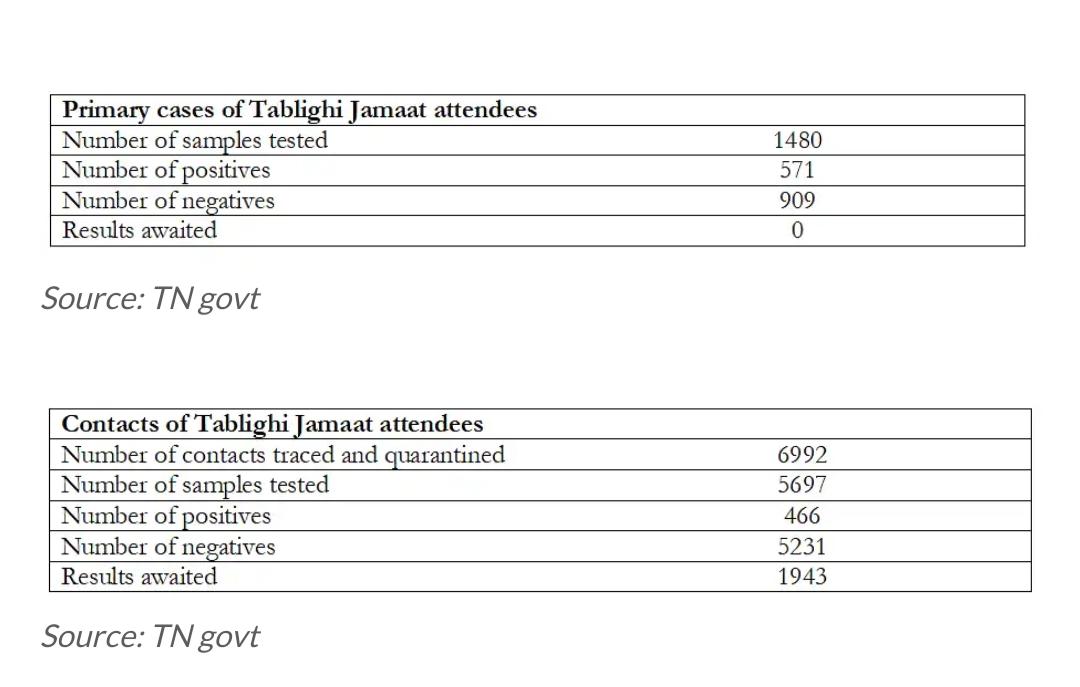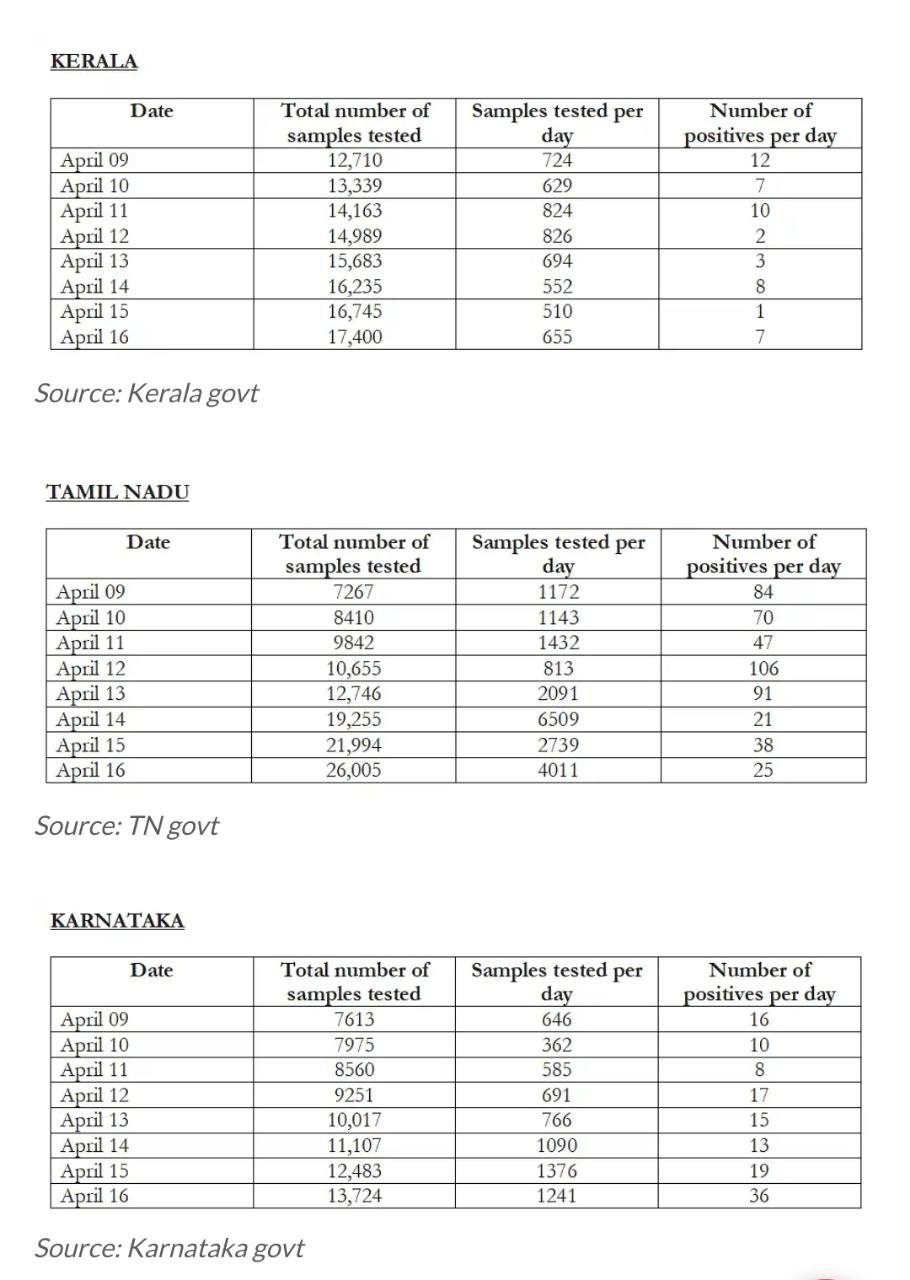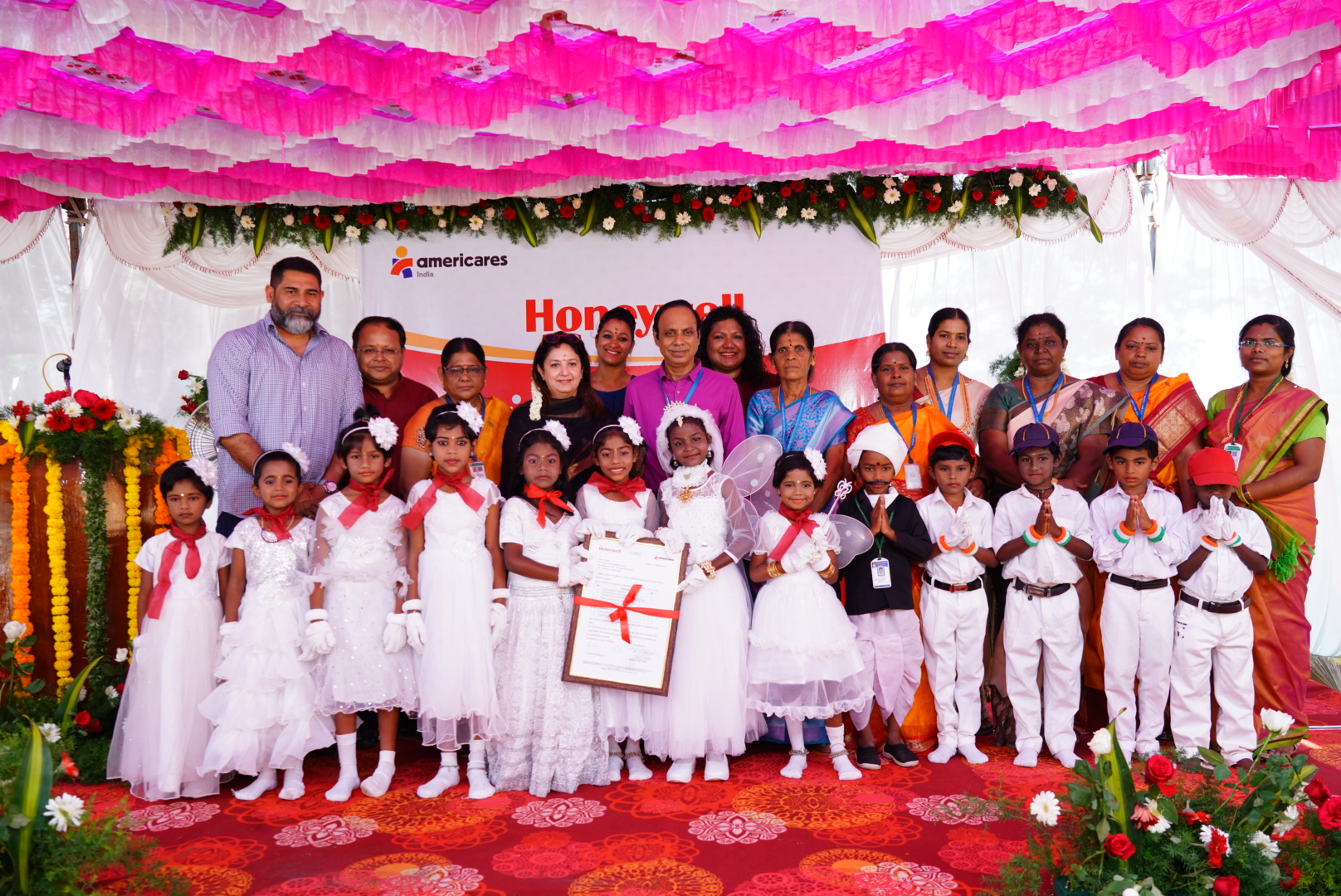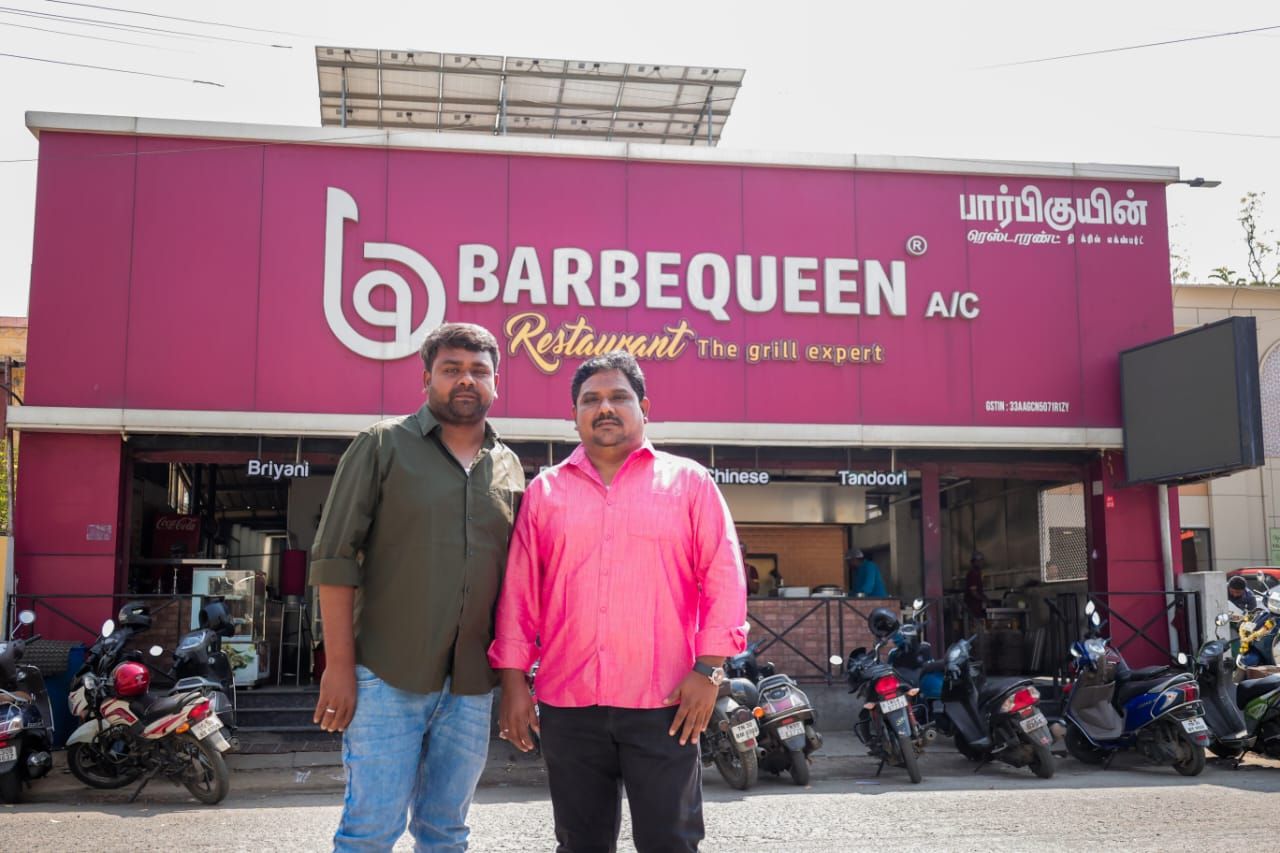Trending Now
- IPL 2024 begins with a bang. First contest between CSK and RCB.
- Election commission allots mike symbol to Naam Thamizhar Katchi
- AIADMK promises to urge for AIIMS in Coimbatore, in its election manifesto.
- Ponmudi becomes higher education minister.
Tamilnadu News
Tablighis Test TN Even As Muslims Face Fallout
![]() April 17, 2020
April 17, 2020
On April 09, Tamil Nadu government officers heaved a sigh of relief.
“We have completely screened Tablighi (Jamaat) visitors,” a senior bureaucrat told The Lede. “Now testing is on for the family members of positive cases among them. Tests will be completed today. The number may spurt for a day or two. Thereafter we will focus on other contacts with symptoms. This may stabilise. Then we will use rapid test to screen all contacts, frontline workers etc, while keeping a close watch on symptomatic cases in general population for detecting accidental spread. By that time cases may stabilise. I think the spread will be brought under control in two weeks,” said the bureaucrat who did not wish to be named.
Until April 11, the daily medical bulletin of the state carried an unchanged number with respect to the number of returnees identified and tested from the Tablighi Jamaat meeting at the Nizamuddin Markaz in Delhi. That number was 1480.
From April 12 though, this data disappeared from the daily bulletin. Not only this, the number of positive cases which were supposed to reduce thereafter, shot up once again.
Take a look at this instructive table that The Lede has collated from the daily bulletins released by the Tamil Nadu state government.
What was supposed to ease off from around April 11 onwards, did not. The number of cases of attendees of Tablighi Jamaat and their contacts, together, went up by 232 in a matter of four days.
So what actually happened?
Sources within the state government told The Lede that a number of returnees from the Tablighi Jamaat event had in fact been traced much after the state believed that they had traced all the attendees.
These included one government doctor in Kayalpattinam who tested positive on April 03. He had not divulged to the government that he too had attended the Markaz.
Five members of his family along with 50 other contacts have been traced subsequently.
More such returnees have also been traced in other parts of the state, although The Lede is yet to confirm the exact number. Tracing contacts of these persons and testing them has further put pressure on the state.
“Only after symptoms were noticed were they brought under treatment. By that time they had spread the disease to many. A drive is going on to test all their family contacts and other contacts. Testing has been heavy in the last two days. Results are awaited for 1900 cases. It (number of positive cases) will be high for 2-3 days. Maybe 200-250. There after we have to see the spread,” said the source.
This was on April 13.
This explains the reason for the unabated spike in the number of COVID-19 positive cases in the state. Authorities are yet to move fully to their original plan of testing all symptomatic cases in containment areas or red zones.
On Friday though, a senior government official informed The Lede that after removing the list of foreign preachers and some duplication, the final number of those from Tamil Nadu who attended the Tablighi Jamaat event stood at 1468.
“There are very few so far from outside of the Delhi cluster,” said the government source. “But for this group, Tamil Nadu would have got over the positive cases. Unfortunately, in Delhi, they had the last day slotted for Tamils by which time the disease had already spread. Also the largest number of people who participated were from Tamil Nadu,” added the source.
The scheduled event for Tamil Nadu believers was between March 22 and 24 as The Lede has already reported.
Fear, Social Stigma & Ostracism
While authorities in Tamil Nadu struggle to cope with the large cluster and trace their contacts in an effort to contain the spread of infection, fear had spread very early on among the Tablighi Jamaat community.
The Lede had a phone conversation with one person who had attended the Tablighi Jamaat conference in Delhi. He is from Warangal, Telangana and is currently in isolation.
The 40 year old man runs a garment business and has a family of five which includes his wife, children and father.
This person travelled by train on March 13 to Delhi by the Tamil Nadu Express and returned to Warangal via the Dakshin Express on March 18. Some of his friends took the Duronto train.
The man revealed a sense of paranoia at being “targeted” and stated that videos on YouTube had added to this feeling of isolation in the larger community.
“I am scared that they are targeting only us,” said the man to The Lede. “I have travelled in Dakshin Express. Why are they not checking the Ticket Collector? I feel that they are not testing anyone except us. One person who is with me who attended the conference says that after coming from Delhi he attended a marriage in Karimnagar and from there he attended a Valima in Suryapet which is a ritual from the boy’s side. There they had two Valima’s of two brothers and had their sister’s marriage too and from there he attended Valima in Hyderabad. Now they (government) have taken everyone into control. Why are they not testing others, why are they testing only our group?” he asked.
When pressed about why he saw contact tracing as a form of targeting, the man stated – “During the lockdown I saw many videos on YouTube which say the reason behind this lockdown could be for CAA and NRC.”
CAA is the Citizenship Amendment Act that was passed earlier this year allowing fast tracking of citizenship for persecuted minority communities from six neighbouring countries. This Act has been viewed with suspicion by Muslim groups and liberals as a communal move by the Centre.
The NRC is the National Register of Citizens which was an exercise carried out in Assam to enumerate the actual citizens of India. The exercise however was a disaster, with lakhs left out of the citizenship rolls.
In Adilabad, the brother of a man who attended the Tablighi Jamaat conference, spoke to The Lede on condition of anonymity.
“Now, after our return and following the news of contraction of virus through Tablighi Jamaat attendees, life has become hell for the families of the eight members from Adilabad district who attended and for Muslim families too in general.
Because of stigmatisation, an announced social boycott is in force. Our families are being viewed as enemies. We are not welcome in the public sphere. People have stopped greeting us. Nobody is buying anything from our shops. Our petty trades have collapsed. Nobody is talking to us favourably. Life has suddenly turned miserable, and we want you to bring this to the notice of the chief minister of Telangana. Every member of my family is a victim of hatred.
All right-wing elements are using this innocuous year-long religious affair as a pretext to attack innocent Muslims, whose earlier trips to Tablighi Jamaat have gone unnoticed. Social media is cycling and recycling old videos to spew venom,” he said.
He lamented that even the sober-minded are scared to defend them. The brother has been shifted to a government quarantine ward for observation.
In Karnataka, there have been at least two incidents of hate and violence against Muslims.
On April 06, in Bagalkote, four persons had gone fishing to another village a few kilometres away. Villagers got together and thrashed the fishermen, calling them carriers of Coronavirus and Tablighi Jamaatis. They only calmed down when they realised that of the four, two were Hindus and that the other two Muslim fishermen had not attended the Jamaat at all. The police have suo motu filed a case and arrested four of the villagers for assaulting the fishermen.
In another instance on April 04, in Bengaluru, a 45 year old Muslim man called Babujaan, was attacked when he was distributing food to people.
“Two people came on a bike and asked for two food packets. I gave it to them. Then more people were taking my food packets. Those people on the bike told them not to take my food because I spread Corona. More people followed me to the Dasarahalli camp and I asked them not to talk like that because I am distributing food packets and I don’t have any Corona. But they continued telling everyone that I was spreading Corona. All of them were wearing masks so I could not identify anyone,” he said.
Similar reports of hatred and violence against Muslims, both Tablighi and non-Tablighi, were being reported in Tamil Nadu too.
Not only was the community being targeted, but identifying, tracing and bringing in those who attended the Markaz and tracing their contacts became a tough task.
Many did not cooperate, many did not speak the truth out of fear and many resisted the attempts of the police and health department officials to quarantine them. In fact, only around 350 of the entire Tablighi Jamaat cluster actually came forward voluntarily out of the total 1480.
The state’s chief secretary convened a meeting of Muslim leaders on April 03, asking for their help and solidarity in reassuring the Muslim community that they were not being targeted or surveyed for NRC, NPR (National Population Register) or CAA but purely to trace the people they had come into contact with in order to save lives and prevent spread.
Following this, in Podanur, Coimbatore, Muslim leaders began to accompany corporation workers and health department officials as they went from home to home to survey those living in Muslim-majority areas.
Muslim leaders advised the community to cooperate with government officials and reassured them that their fears of NRC or CAA were unfounded. They also conducted special camps to test the locals. They also explained the need for social distancing and regular hand washing to ward off the virus.
“If district authorities reach out to Muslim organisations, we are all happy to help in the efforts to curb the spread of the virus,” said Raja Hussain, Convenor, Federation of All Muslim Organisations told The Lede.
In Nirmal district of Telangana, local Muslim leaders exhorted the public to cooperate with health officials and sought to dispel the fear of NPR or NRC.
“In the whole city and the country, surveys are being conducted by Asha workers,” said Ilyas Ahmed Hamid Qasmi, Imam in Nirmal.
“They are collecting details of who has symptoms of the virus. It is our responsibility to cooperate with them and to provide information to them. This has nothing to do with NPR or NRC. It is only for your health,” he added.
Testing In South India
Testing has been ramped up to a large extent in the south Indian states.
Tamil Nadu is currently at the forefront of testing, averaging 2488 tests per day in the past eight days.
Karnataka has averaged around 845 tests per day in the past few weeks.
Kerala, whose numbers of new positive cases have dropped to single digits in the past week, has puzzlingly drastically reduced testing instead of increasing the same. While it is being hailed as the state that “flattened the curve,” reduced testing could also be the reason for lower numbers of infected persons.
Kerala now averages close to 677 tests per day, a number far below what it was earlier doing.
While data from the Telugu states are not readily available, The Lede analysed the data from the other four southern states.
Andhra Pradesh received, on Friday, one lakh rapid test kits from South Korea. The consignment arrived on a special flight from Seoul and will be dispatched to all districts.
A similar break up for Andhra Pradesh, as given above, is not available but the state has tested a total of 20,235 samples as on April 16.
The Telangana government has not offered any details on testing whatsoever.
It is imperative now, in the window offered by Lockdown 2.0, that governments test as much as possible so as to ensure that community spread is nipped in the bud.
If states like Kerala take their feet off the accelerator now, there could very well be a resurgence of the viral infection a la South Korea and that would only mean more loss of life, damage to economy and debilitation of resources.





